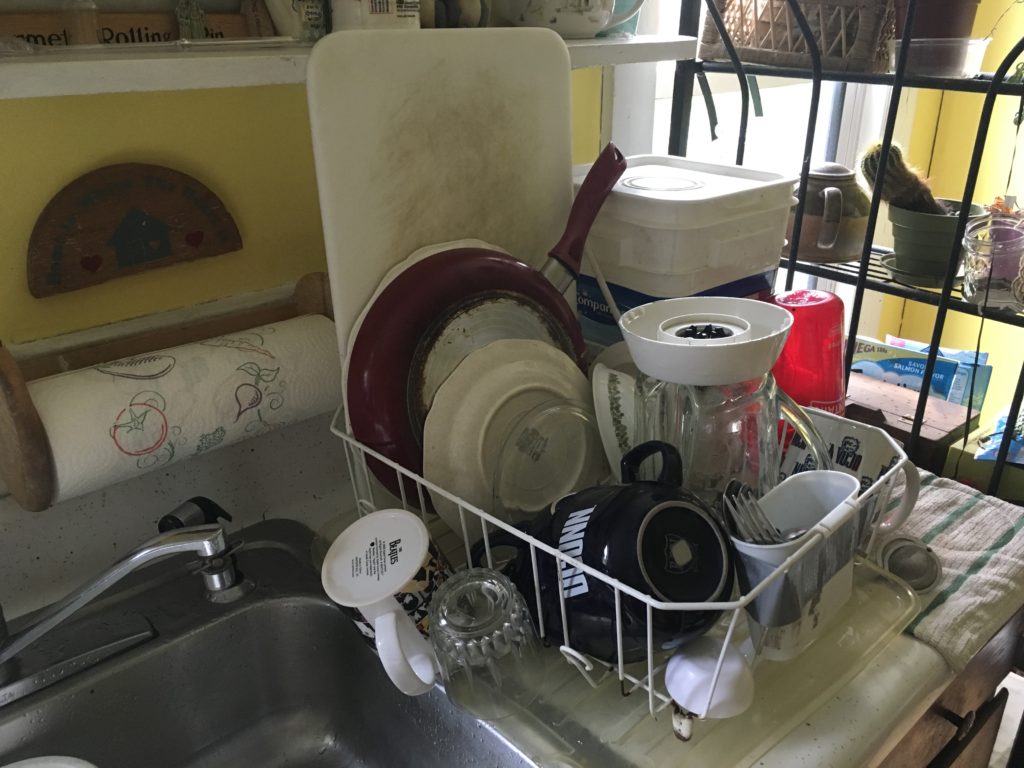My solution to our broken dryers was hanging clothes on a clothesline. As I negotiated the best sequence for hanging up our wet garments I recalled that my Mom did the same thing on this same clothesline, presumably without regretting the lack of a household dryer, since they were not yet common. She did not know any better.
I estimated the hanging up and taking down of clothes on the line added 10-15 minutes to my day that would have been saved by a dryer. Yet they were 10-15 minutes spent in the healthy outdoors; they were 10-15 minutes spent pondering, much like I do when washing dishes. If given a choice I would rather have a dryer than a dishwasher, but I can structure my life without the dryer at least until fall. Problem solved.
Problem solving is part of being a caregiver, particularly when circumstances always change in the wrong direction. This past week I had a problem with a bathroom mess. Once upon a time I would have thought the situation was suited more for a nurse, as with many things I now do. Rather than feelings of apprehension or disgust with the task I found myself feeling a sense of pride. The way I efficiently handled the situation reflected years of honing a craft, an unpleasant but necessary one. Absolutely nothing about my caregiver routine bothers me any more than washing dishes or hanging clothes on a line. Having determined the necessity of what I do, perhaps I don’t know any better.
Instead, I can sum up the unsolvable problem I have in a nutshell. Sometimes I feel like getting to do things I love again will take forever, and when finally I get to do those things my best friend will not be with me. All my “life sucks” moments derive from that one sentiment. Yet balancing that out are the problems solved and the areas of growth these reveal.
We all have our strengths and weaknesses, but we also have reservoirs of untapped brain potential. I am able to solve any logic problem I encounter (I even got an 800 on the analytical portion of the GRE), but can not rebuild a car engine. Indeed, I turn everything I do into a logic problem. As I wash the dishes I am ever mindful of how I want to stack what I wash in the dish strainer and plan accordingly. When visiting companions wash the dishes they sometimes amaze me with the haphazard and chaotic stacking I see afterwards, reminiscent of a game of “pick-up sticks.” Now I know how the Monica character on Friends felt about others cleaning her apartment.
I know people for whom the reverse is true; they can rebuild a car engine but would be stumped by Aristotelian logic. There may be differences in our brain biochemistry, but the real determinants are the differences in our experiences. I am considered the black sheep out of all my handyman siblings and nephews. I always will be. Yet years of being a caregiver, plus perhaps watching a little too much HGTV, now leads me to believe I can renovate the house myself.
This may never happen. Apart from the finances required I have higher priorities for the future, like finally doing the things I love again. I have much catching up to do. Yet the belief now that I could renovate my house reflects a growing confidence that I can do whatever is necessary as the need arises. If I should find the time and finances to renovate the house, be assured that I may open up the floor plan to put an island in the kitchen, but I still am not getting a dishwasher.

